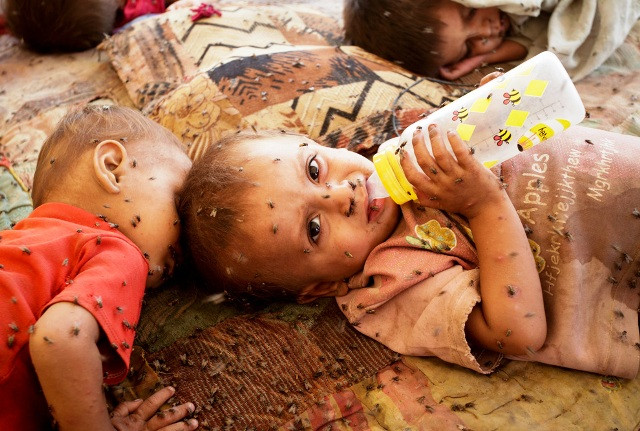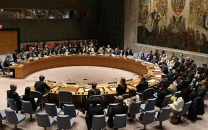One child dies every minute in Pakistan: Report
The Pakistan Medical Association's annual report shows the grim reality of child healthcare in the country.

One child dies every minute in Pakistan: Report
This grim picture of the deteriorating child health situation could be seen in the annual health report of the Pakistan Medical Association (PMA) for the year 2011, which says one child dies every minute from EPI (expanded program on immunisation diseases), diarrhea and acute respiratory infection (ARI).
The report also reveals that every year about 400,000 infants die in the first year of their life.
Child health in Pakistan is among the most important national issues that need serious attention.
Child mortality in Pakistan is a major cause of concern, with every one among 10 children dying before reaching the age of five and one among 30, just after they are born.
Pakistan is among the developing nations of the world that has yet to do much for the welfare of the general public.
Pneumonia and air pollution seem to be the factors affecting the health of Pakistani children. The air pollution is mostly caused by harmful emissions of biogas, which is used in most houses of Pakistan.
The main reason behind growing child mortality in Pakistan is lack of child healthcare facilities in rural areas, where majority of population lives.
Low state spending on healthcare, abject poverty, low literacy, lack of skilled birth attendants, widespread communicable diseases, insufficient emergency child health services in government run district and rural hospitals are amongst other major reasons behind growing diseases in children.
Maternal, newborn and child health care statistics in Pakistan are some of the poorest in South Asia.
A holistic approach is needed to improve maternal and newborn health, mainly by improving and upgrading facilities at the district hospitals. Most common and lethal diseases in Pakistan include (ARI) acute respiratory, infection, viral hepatitis, malaria, diarrhea, dysentery, scabies, goiter, hepatitis and tuberculosis.
Among the victims of acute respiratory infection (ARI) most vulnerable are children whose immune systems have been weakened by malnutrition.
Majority of children visiting hospitals and dispensaries suffer from the respiratory ailments and serious attention is needed to provide better medical treatment to children living in rural areas. Viral hepatitis, particularly that caused by types B and C are major epidemics in Pakistan with nearly 12 million individuals infected with either of the virus. The main cause remains massive overuse of therapeutic injections and reuse of syringes during these injections in the private sector healthcare.
Children are also amongst the hepatitis patients and their number is growing sharply. Malaria is a problem faced by the lower class people in Pakistan. The unsanitary conditions and stagnant water bodies in the rural areas and city slums provide excellent breeding grounds for mosquitoes.
Like adults, children also suffer from malarial diseases, which needs serious attention of healthcare policymakers. Diarrhea is rampant in the country due to use of contaminated water. It is estimated that about 20 per cent of diarrhea patients are children. Similarly, diseases like dysentery, scabies, dengue, goiter are also on the rise.
Expanded Programme on Immunization (EPI) Pakistan provides vaccination against childhood tuberculosis, poliomyelitis, diphtheria, pertussis, tetanus, hepatitis B, haemophilus influenza type b and measles, besides protecting pregnant ladies with tetanus toxoid and their neonates against neo-natal tetanus.
However, there is no success even to control polio. Most births which take place at home under untrained supervision, which are responsible for alarming mortality of mothers and newborns.
Children under the age of five face multiple obstacles, including birth injuries and infectious diseases. Millions of children suffer from short- and long-term adverse consequences of illnesses, malnutrition and injuries that impact their well-being and options in life, including fewer educational opportunities and diminished future economic prospects.
Child health is closely related to maternal health, as nutrition during pregnancy, birth conditions, birth spacing, and health status of the mother impact the health of the child prior to, during and after birth.
Largely because of these factors, three million infants are stillborn each year.
The recent devastating floods in Pakistan have further increased the disease burden. United Nations Children's Fund (UNICEF) says as many as three and a half million children in flood-ravaged Pakistan may be at risk of contracting deadly diseases carried through contaminated water and insects. UNICEF says the greatest threats to public health in Pakistan at the current time are certainly from waterborne diseases, which can intensify in precarious hygiene conditions, and when people have limited or poor access to safe water and sanitation services.
Diseases like cholera or acute watery diarrhoea, dysentery or bloody diarrhoea, typhoid fever and hepatitis, can all cause excess mortality and morbidity amongst the susceptible populations in the flood-hit areas.
There is also an increased risk of malaria and dengue fever, since the stagnant water may provide an ideal breeding ground for mosquitoes — the vector that is responsible for transmission.
To cope with the situation, the government must open more children hospitals in the country. In Sindh province, there is just one big children hospital, National Institute of Child Health (NICH), running in Karachi by the federal government. There is dire need to open more children hospitals in the province and improve children departments in the hospitals of government-run teaching colleges in Karachi, Hyderabad, Jamshoro, Nawabshah, Sukkur and Larkana.
In order to save lives of children, pediatric wards should be opened in all district headquarter hospitals, where emergency services along with trained child disease experts should be made available.



















COMMENTS
Comments are moderated and generally will be posted if they are on-topic and not abusive.
For more information, please see our Comments FAQ